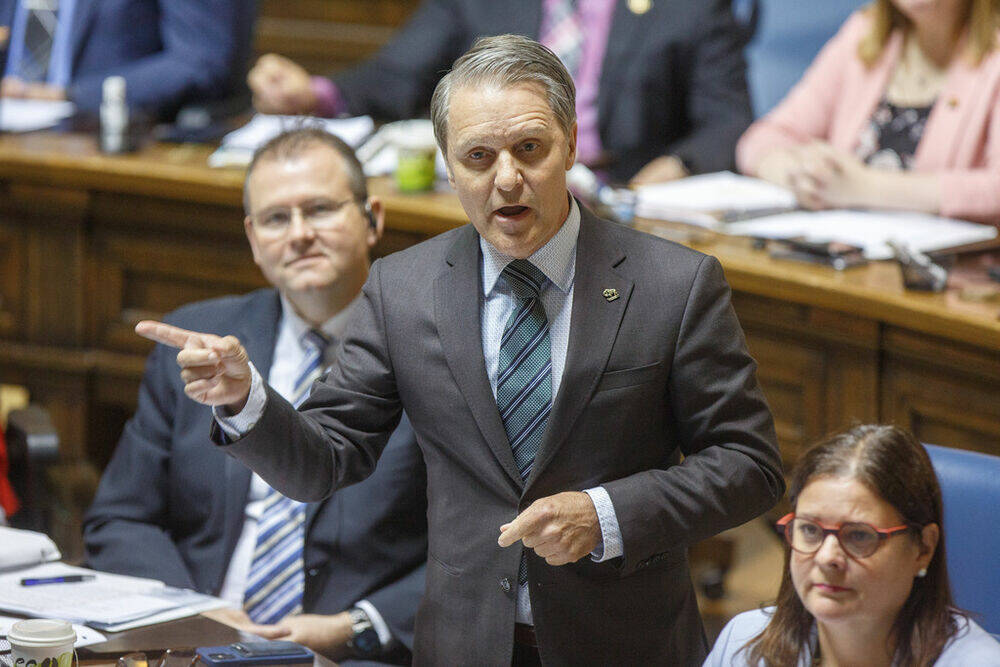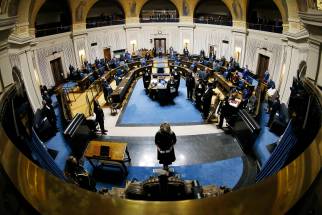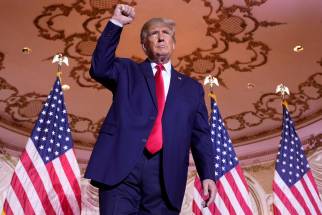Tories shake off potential NDP election pitch
Read this article for free:
or
Already have an account? Log in here »
To continue reading, please subscribe:
Monthly Digital Subscription
$0 for the first 4 weeks*
- Enjoy unlimited reading on winnipegfreepress.com
- Read the E-Edition, our digital replica newspaper
- Access News Break, our award-winning app
- Play interactive puzzles
*No charge for 4 weeks then price increases to the regular rate of $19.00 plus GST every four weeks. Offer available to new and qualified returning subscribers only. Cancel any time.
Monthly Digital Subscription
$4.75/week*
- Enjoy unlimited reading on winnipegfreepress.com
- Read the E-Edition, our digital replica newspaper
- Access News Break, our award-winning app
- Play interactive puzzles
*Billed as $19 plus GST every four weeks. Cancel any time.
To continue reading, please subscribe:
Add Free Press access to your Brandon Sun subscription for only an additional
$1 for the first 4 weeks*
*Your next subscription payment will increase by $1.00 and you will be charged $16.99 plus GST for four weeks. After four weeks, your payment will increase to $23.99 plus GST every four weeks.
Read unlimited articles for free today:
or
Already have an account? Log in here »
Hey there, time traveller!
This article was published 24/11/2022 (1116 days ago), so information in it may no longer be current.
Manitoba’s Progressive Conservative government may have stolen the Opposition NDP’s thunder on its pledge to freeze electricity rates.
Finance Minister Cameron Friesen announced Wednesday government will immediately cut in half two major fees Manitoba Hydro pays to the province, saving the Crown corporation almost $190 million a year. According to recent figures published by Hydro, that would be more than enough to pay for rate freezes in 2023 and 2024.
In its rate application to the Public Utilities Board earlier this month, Hydro estimates this year’s rate increase of 3.6 per cent (which came into effect Jan.1) and its proposed increase of 3.5 per cent in each of 2023 and 2024, would generate close to $200 million in annual revenue by 2024-25.
Savings from the province’s 50 per cent cut to water power rental rates and the debt guarantee fee it charges Hydro would exceed lost revenues if a rate freeze were implemented between now and 2024-25.
Hydro’s bottom line would even improve slightly because the province’s fee reductions are retroactive to April 1; the company will start saving almost $190 million a year right away.
Finance Minister Cameron Friesen (Mike Deal / Free Press files)
Projected revenues from this year’s rate hike (which is still an “interim” increase) is $64.8 million. The combined revenue from this year’s rate and next year’s proposed one is estimated at $104.8 million. The cumulative amount rises to $194.8 million in 2024-25.
It’s unclear how the NDP would propose to freeze electricity rates.
NDP Leader Wab Kinew pledged earlier this month, if his party won government in the 2023 election, he would create “an environment” for a rate freeze. He said details would be unveiled closer to the vote.
If the NDP were considering cutting or eliminating water power rental charges and/or the debt guarantee fee to achieve that goal, the Tories beat them to it.
It’s unlikely Hydro will ask the PUB for a rate freeze, even though it could now that it’s paying lower fees to the province. There are other factors Hydro must consider when setting rates.
For starters, the $190 million in annual savings from the fee reductions may not grow much, if at all, in future years.
Water power rental charges are based on water flow; during low water years, those charges fall. The debt guarantee fee is based on a one per cent levy of Hydro’s total debt. As the company pays off debt, the fee amount drops.
More importantly, Hydro faces a slew of financial risks it must be prepared for, including rising interest rates, a rapidly changing export market, and the potential for consecutive years of drought.
As part of maintaining a financial cushion to guard against those risks, Hydro applies for modest rate increases even in years it doesn’t need the extra cash to balance the books. It tries to smooth out rate increases over time to avoid rate shock.
The financial risks Hydro faces are almost impossible to predict. For example, in each of the next 10 years, about five per cent of Hydro’s debt is expected to mature, the majority of which will have to be refinanced. As interest rates rise, debt will be refinanced at higher rates. No one knows how high interest rates will go; it will depend largely on how well the Bank of Canada curbs current inflation.
It’s unclear how the NDP would propose to freeze electricity rates.
Hydro also expects long-term “dependable” export sales to decline in the near future as contracts expire. Those revenues will be replaced to some degree by short-term, or “opportunity,” export sales, as well as by growing domestic demand. However, short-term exports of excess power are less predictable and tend to fall sharply during low water years.
“This reduction in export sales revenue starting in 2025-26 is not immediately replaced by domestic revenue and, as such, results in reduced revenues for several years starting in 2025-26,” Hydro stated in its rate application.
“As opportunity export sales volumes make up a larger portion of total export sales volumes, there will be a greater degree of uncertainty in export revenues as opportunity export sales are dependent on both water flows and market prices.”
That’s a lot of uncertainty.
Hydro will undoubtedly reduce its proposed 3.5 per cent rate increases for 2023 and 2024, but they probably won’t fall to zero. However, they may get halfway there.
That would be good for consumers. It would also take some of the zing out of an NDP rate-freeze pledge.
tom.brodbeck@freepress.mb.ca

Tom has been covering Manitoba politics since the early 1990s and joined the Winnipeg Free Press news team in 2019.
Our newsroom depends on a growing audience of readers to power our journalism. If you are not a paid reader, please consider becoming a subscriber.
Our newsroom depends on its audience of readers to power our journalism. Thank you for your support.









